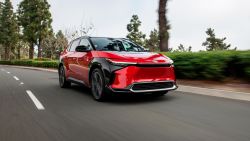Workers at the Ultium Cells plant, co-owned by General Motors and Korean giant LG, voted overwhelmingly this week to join the United Auto Workers union. It’s a huge win for the UAW that has major significance for the auto industry.
The vote happened at Ultium’s first-ever plant in Warren, Ohio, which started production of batteries for GM’s new line of electric vehicles in September. Early Friday morning the union announced 710 had voted in favor of the union and only 16 opposed, with about 900 workers eligible to vote in the election.
“As the auto industry transitions to electric vehicles, new workers entering the auto sector at plants like Ultium are thinking about their value and worth,” said UAW President Ray Curry. “This vote shows that they want to be a part of maintaining the high standards and wages that UAW members have built in the auto industry.”
Ultium released a short statement Friday: “We respect the decision of our Ohio workforce supporting representation by the UAW. We look forward to a positive working relationship with the UAW.”
EV battery plants needed as the industry shifts
Traditional automakers are rushing to build EV battery plants across the United States as they rush to meet ambitious goals to shift from vehicles powered by traditional internal combustion engines [ICE] to EVs.
Like Ultium most of those battery plants are joint ventures with battery makers rather than wholly owned by the automakers themselves. That means the workers at those new plants will not be part of the UAW unless they vote to join.
The shift to EVs planned by the industry has huge implications for the industrial union, since it takes an estimated 30% to 40% less labor to assemble an EV than a traditional car, which has far more moving parts.
Many of the jobs at automakers go into building engines and transmissions, which are replaced by small electric motors and large battery packs in EVs. So it’s crucial for the UAW to be able to organize these slew of joint venture battery plants popping up nationwide.
While GM (GM) is not the sole owner of the plant, its executives welcomed the union in hopes it helps to maintain labor peace with contract talks looming next fall.
“We’re a company that’s worked with unions around the world for many years, so we welcome Ultium having union representation,” said GM CEO Mary Barra on Thursday ahead of the vote in comments reported by the Detroit Free Press and confirmed by GM.
GM, along with rivals Ford (F) and Stellantis face contract talks with the UAW in fall of 2023. GM suffered a nearly six-week strike, greatly focused on job security issues after the closing of the plants in Lordstown and elsewhere.
It makes sense for the company to not fight the unionization effort as have other companies facing union vote, such as Amazon and Starbucks, have done this year, said Dan Ives, tech analyst with Wedbush Securities.
“GM is going fully EV, and the last thing they want is to battle the UAW,” said Ives. “This sets a significant precedent on this first vote.”
Contracts
Now comes the big question: What kind of contract the workers will get. Ultium said its workers an average of $18 an hour, while veteran hourly workers at GM get a top pay of $32.32 an hour. GM has indicated it can’t afford to pay Ultium workers anywhere near that much.
“Ultium Cells is committed to providing competitive total compensation packages,” said Ultium in a statement. “Our wages and benefits are determined by the company through benchmarking competitors, market conditions and what it takes to attract and retain the talent we need to be successful.”
Typically wages at auto suppliers are significantly below what is paid by the automakers. But it’s not clear if the union will see these jobs are more akin to supplier jobs or the jobs making engines or transmissions at automakers’ own plants as they set their bargaining goals.
Barra said Thursday that GM is interested in Ultium reaching a first contract with the union “as soon as possible.”
“We’ve got to be competitive to have a company and go forward,” she said. “We’ve had that conversation with employees on the floor and they get it.”
This year has seen a surge of union organizing votes, with a successful campaign to organize 270 Starbucks (SBUX) stores nationwide, an Amazon (AMZN) warehouse in Staten Island becoming the first Amazon (AMZN) facility to vote for union representation, along with two Apple (AAPL) stores becoming the first Apple (AAPL) locations to vote to join unions.
But among those high profile union votes, only the Amazon facility had more workers than the Ultium factory. Besides the Amazon facility, the only larger employers to have their workers vote to join a union so far this year were the Massachusetts Institute of Technology, where 3,800 graduate students were in the group that voted nearly two-to-one in favor of union representation, along with hospitals in Pasedena and Palo Alto, California and Portland, Maine, where groups of nurses voted to join unions.

























